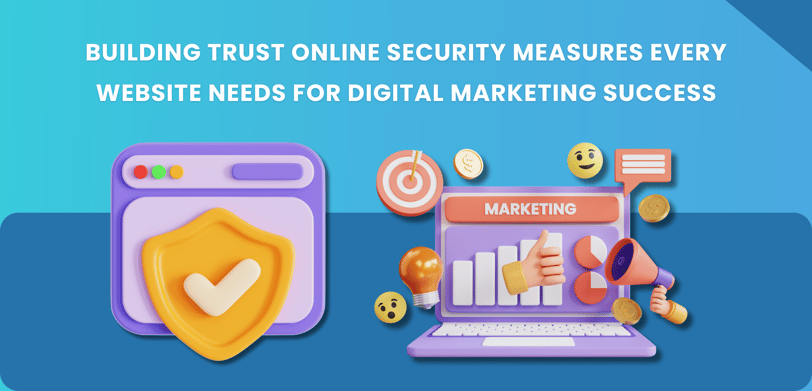
Building Trust Online Security Measures Every Website Needs for Digital Marketing Success
Building trust online is essential for digital marketing success, and it starts with strong website security. Implementing measures like SSL certificates, data encryption, and two-factor authentication reassures visitors that their personal information is safe. These security practices help protect your site, enhance user confidence, and ultimately boost engagement and conversions.


In the digital age, trust is a cornerstone of any successful online presence. Whether you're running an e-commerce store, a blog, or a service-based website, your visitors must feel confident that their personal information is safe. This sense of security is crucial, not only for customer retention but also for achieving digital marketing success. Without trust, your marketing efforts will fall flat, no matter how much traffic or engagement your site generates.
Building that trust starts with implementing strong online security measures. In this blog post, we’ll explore the essential security steps every website needs to build trust and succeed in digital marketing.
Why Security is Key to Digital Marketing Success
Before diving into the specific measures, it's essential to understand why security is so integral to digital marketing. Consumers today are more aware of the risks of data breaches, phishing, and identity theft. With cyberattacks on the rise, they are far more cautious about the websites they visit and share personal information with.
Without proper security, your website becomes a liability, and any digital marketing campaign you run—whether focused on SEO, paid ads, or email marketing—will be undermined. Imagine driving thousands of visitors to your site, only for them to leave because they don’t trust your platform. Worse, a security breach can lead to long-term reputational damage that could take years to recover from.
By prioritizing online security, you build a foundation of trust that will enhance customer confidence, boost conversions, and lead to greater marketing success.
Essential Security Measures Every Website Needs
Here are the critical security steps every website should implement to protect its visitors and earn their trust:
1. SSL Certificates (HTTPS)
An SSL (Secure Socket Layer) certificate encrypts data transferred between the user’s browser and your website, ensuring that sensitive information such as passwords, credit card numbers, and personal data remains private. Websites with SSL certificates display “HTTPS” in the URL bar, along with a padlock icon—visual signals that tell users your site is secure.
Why It Matters for Marketing:
Not only does SSL encryption protect user data, but it also impacts your SEO rankings. Google prioritizes secure websites in search results, making an SSL certificate essential for improving visibility in search engines and increasing organic traffic.
2. Strong Password Policies
If your website allows users to create accounts, one of the easiest ways to improve security is by enforcing strong password policies. Weak passwords are a leading cause of data breaches, as hackers often exploit common or simple passwords to gain access to accounts.
What to Implement:
Require passwords to include a mix of uppercase letters, lowercase letters, numbers, and special characters.
Set minimum password lengths (at least eight characters).
Encourage or require two-factor authentication (2FA) for additional security.
Why It Matters for Marketing:
A user-friendly account creation process combined with strong security reassures users that their data is protected, making them more likely to complete sign-ups or purchases—key steps in your marketing funnel.
3. Data Encryption
In addition to encrypting data during transmission (via SSL), sensitive information stored on your website—such as user profiles, transaction details, and emails—should also be encrypted. Encryption ensures that even if hackers gain access to your database, the data will be unreadable without the correct decryption key.
Why It Matters for Marketing:
In the event of a data breach, encrypted data provides an extra layer of protection, minimizing the risk of exposure. A security incident can severely harm your brand's reputation, driving away customers and damaging long-term trust. Encryption helps mitigate that risk.
4. Secure Hosting and Regular Updates
Your web hosting provider plays a crucial role in maintaining your site’s security. Opt for a hosting provider that offers advanced security features such as firewalls, malware scanning, and automatic backups. Additionally, regularly updating your website’s software, plugins, and themes is essential to prevent hackers from exploiting outdated vulnerabilities.
Key Features to Look for in a Hosting Provider:
DDoS (Distributed Denial of Service) protection.
24/7 monitoring and customer support.
Regular, automatic backups.
An easy-to-use dashboard for managing security features.
Why It Matters for Marketing:
A website that's constantly down due to security vulnerabilities will lose visitors, hurt SEO rankings, and disrupt your marketing efforts. Secure, reliable hosting ensures uptime and instills trust in your audience.
5. Privacy Policy and GDPR Compliance
Consumers are increasingly aware of how their data is collected, stored, and used. Displaying a clear privacy policy that explains how you handle user data is not only a legal requirement in many countries (under laws such as GDPR in the EU), but also a way to build trust with your audience.
Why It Matters for Marketing:
Being transparent about data collection shows visitors that you respect their privacy. Many users check privacy policies before making purchases or sharing personal information. A clear and compliant policy encourages visitors to trust your website and complete transactions.
6. Website Firewall and Malware Scanning
A Web Application Firewall (WAF) helps protect your website from malicious traffic, including hacking attempts, bots, and DDoS attacks. Additionally, running regular malware scans helps you identify and remove potential threats before they harm your site or users.
Why It Matters for Marketing:
A hacked website can quickly lose credibility with customers. Once flagged as unsafe by browsers or search engines, your organic traffic will plummet, and paid campaigns will become ineffective. Preventative measures like firewalls and malware scanning keep your website safe, operational, and trusted by users.
7. Two-Factor Authentication (2FA)
Two-factor authentication (2FA) adds an extra layer of security for account logins. In addition to entering a password, users must provide a second form of verification, such as a code sent to their phone. This significantly reduces the risk of unauthorized access, even if a password is compromised.
Why It Matters for Marketing:
When users feel their accounts are secure, they are more likely to engage with your site, sign up for newsletters, or make purchases. 2FA reassures users that your website takes security seriously, contributing to higher conversion rates.
8. Regular Security Audits
Conducting regular security audits is an essential part of maintaining a secure website. Audits help identify vulnerabilities, ensure compliance with data protection laws, and assess the effectiveness of your existing security measures.
What to Include in a Security Audit:
Check for outdated plugins, themes, or software.
Review user access controls to ensure only authorized personnel have access to sensitive information.
Test backup systems to ensure data can be recovered in case of an attack.
Conduct penetration testing to find weaknesses hackers might exploit.
Why It Matters for Marketing:
Security audits help you stay proactive rather than reactive. By identifying potential security gaps before they become major issues, you can maintain a trustworthy site that continues to perform well in marketing campaigns.
Conclusion
When visitors feel confident that your website is secure, they are more likely to stay, engage, and convert. Each security measure you implement, from SSL encryption to strong password policies, contributes to building that essential trust. In today’s competitive online landscape, trust is one of the most valuable assets your brand can have, and it’s built through security.
Without these measures in place, your digital marketing efforts may be compromised by security breaches, data theft, or even loss of credibility. But when your audience knows their information is safe, you’ll enjoy higher conversion rates, better brand loyalty, and a solid foundation for long-term marketing success.
By making online security a priority, you’re not just protecting your website—you’re investing in your brand’s future.
